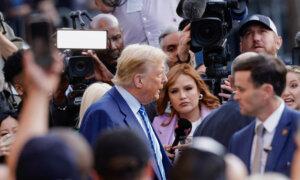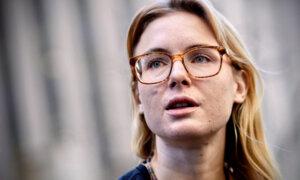Both cases prosecuted by the special counsel will miss their original trial dates.
“Following their pattern, the defendants responded to the Court’s deadline by seeking another postponement,” he wrote.
Mr. Smith is prosecuting two cases against President Trump. One has been stalled past its initial trial date in Washington. The second one will now miss its scheduled May 20 trial date as well.
President Trump will be tied up in court in New York for six to eight weeks, except Wednesdays, as he faces trial on 34 counts of falsifying business records in 2017.
As a criminal defendant, President Trump’s presence is required, unless he obtains a waiver. That seems unlikely, as the presiding judge on April 15 warned the former president that he would face arrest if he is absent and declined to excuse him on April 25 for arguments before the U.S. Supreme Court in yet another criminal case he faces.
When the New York trial was scheduled, legal counsel in the documents case notified the judge and later proposed a new schedule.
May 9 Deadline
Meanwhile, the parties have been litigating what classified information can be shared between parties and publicly.
U.S. District Judge Aileen Cannon recently set deadlines for motions related to these issues. Notably, she set a May 9 deadline for defendants to file a notice on classified discovery they’ve received.
Prosecutors proposed a July 8 trial, President Trump proposed an August 12 trial, and codefendant Waltine Nauta proposed a September 8 trial.
Defendants also asked to postpone some of the pretrial schedule, including the May 9 deadline.
Prosecutors responded, arguing that this was the “latest delay tactic.”
“This Court set the May 9 deadline fully apprised of defendant Trump’s New York trial.
“Although the defendants’ motion reads as though the Court were unaware of Trump’s other case, and as if the defendants had no forewarning that a Section 5 deadline would be set, those premises are plainly wrong,” the response reads.
Prosecutors argued that the defendants had “ample notice” that they would have had to submit arguments around their classified information motion, and “have already had months to complete the work.”
The entire process of this case has been marked by discovery issues, with the defense arguing that the government has denied it relevant discovery and prosecutors arguing that they have gone to great lengths to make information accessible.
Key matters include what information the parties will be allowed to share publicly versus keeping under seal—such as potential witness names and interview transcripts—and how much information the defense will be allowed to access.
The May 9 deadline is for the defense to notify the court as to what classified information they have already received in discovery.
Prosecutors argue that the vast majority of this has been in the defense’s possession since last November, and that at the beginning of this year, the defense received the prosecution’s list of expert witnesses.
“It is true that the defendants must access that submission in a SCIF [sensitive compartmented information facility],” prosecutors wrote. “But they have already had three months to do so, which is more than adequate time.”
“The defendants’ claim that they need the entire duration of Trump’s New York trial and three additional weeks to prepare their CIPA Section 5 notice and expert witness disclosures strains credulity and belies their true objective: delay,” the prosecutors claimed.
Same Attorneys
They faulted President Trump for choosing some of the same lawyers to work multiple cases.
Defense counsel argued that defendants have due process rights to choose their attorneys, protected by the Constitution, but prosecutors argued that this right is not “boundless.”
“No court has ever found it to be implicated under circumstances remotely resembling these,” prosecutors argued.
They claimed that the right to choose one’s attorney should be balanced against the need for “prompt and efficient administration of justice.”
In Florida, President Trump is being represented by attorneys Chris Kise, Emil Bove, Lazaro Fields, Stephen Weiss, and Todd Blanche.
Mr. Bove and Mr. Blanche also represent President Trump in his ongoing criminal trial in New York, and Mr. Weiss works in Mr. Blanche’s firm. Mr. Kise is representing President Trump in a separate civil fraud case in New York that is heading into appeal.
Prosecutors argued that each case involves a local attorney who could take on more work, and that the overlapping cases was not a defense.
“Having made such decisions, they should not be allowed to use their overlapping engagements to perpetually delay trial in this case,” prosecutors argued. “Not to mention, the defendants have capable local counsel who can contribute to the work.”
Original News Source Link – Epoch Times
Running For Office? Conservative Campaign Consulting – Election Day Strategies!


